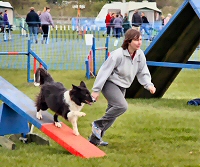Noise Control & Agility
|
|
|
Co-sponsors of the 2023 Winning Out
Certificates |
The bark stops here...
|
|
I do think that some dog venues and some dogs in agility are incredibly noisy and have thanked all the gods that Iím not the enforcement officer for the area, as I would not be able to defend them to a complainant. As a sport we have a case to answer as to what face we present to the outside, very noise sensitive, world.
Complaints from neighbours are usually the key noise issue, but if a club has a serious noise problem it can lead to internal problems such as more sensitive dogs being intimidated or distressed by the Ďshoutersí and the prevention of effective teaching if classes canít hear the instructor.
When a club has received complaints and the Council has become involved, it is useful to speak to the noise control officer and establish what they think is reasonable under the circumstances. It is important to try to be co-operative, because a noise source being argumentative and difficult makes enforcement much easier, It becomes much more clear cut when someone acts into the role of the Ďbad guyí.
The club will need to prove that they have taken every reasonable precaution to prevent training being noisy. For example:-
Devise a noise control policy and explain and distribute it to all club members
Demonstrate that noisy activities have been located in the least noise-sensitive area of the site
Devise a training strategy for noisy dogs and show how it is being implemented. It may be difficult to stop a habitual barker from barking in the ring without removing his enjoyment of the game, but what about the rest of the time?
A few of my own noise control officer Ďred ragsí are a dog barking itís head off on the end of a lead while the owner does nothing and vehicles containing dogs barking at an external trigger with no effort made to relocate the trigger or the vehicle or otherwise remove the stimulus. If a visiting noise control officer sees something like that it will not help a dog club trying to prove they are making all reasonable efforts Ė the whole club needs to get involved with training for quiet with as much effort as they put into training to get their touch points.
 How
noise is investigated
How
noise is investigated
When investigating a complaint about noise, a noise control officer will look for evidence
that the noise complained of materially affects someoneís use and enjoyment of their own
property, usually that it is audible to a degree that canít be ignored and it is persistent.
They will want to form an independent opinion about this, as neighbour disputes are rarely
about one thing, and noise matters will often be interspersed with complaints about how party
'A' started it by parking over party Bís drive, and then party 'B' unreasonably cut party 'Aís'
hedge because it crossed a boundary line, etc. etc. Noise frequently gets raised because it is
one of the few areas of dispute that has enforceable legislation. A phrase came into use to
describe how noise control officers should assess nuisance following an important legal
opinion, ''what would the man sitting on the top deck of the Clapham omnibus think?' Ė i.e.
someone not directly involved in the dispute.
There will be a review of whether the noise is reasonable and controllable. For example, it has been defined by past court cases that it is reasonable to practice playing musical instruments at home, and because it isnít possible to play an instrument silently in most cases, it is necessary to set times and durations where it can take place. If agreement cannot be reached, this may eventually fall to a court to decide. The courtís opinion on how much is reasonable is rarely agreed with by either party in the dispute.
This then begs the question, can agility training take place quietly and if so, is it reasonable to ask that to be the case, and can it be controlled? My personal opinion, which has not been tested in court, is that we are in the business of training dogs, and I doubt that a court is going to accept a plea that noise from dogs canít be controlled by a group of dog trainers.
There is legal precedent that it isnít reasonable to put such severe controls on a business that they would go out of business. However, hobby groups are in legal 'no manís land' there because they are neither a business nor residents with a right to use their home as they see fit. A solicitorís opinion could be sought on this point if a club has serious noise problems that have resulted in them being served with a Notice by the council.
 Formal
action
Formal
action
If the council investigates and comes to the conclusion that a statutory nuisance exists,
they have to serve an Abatement Notice requiring the nuisance to be abated. Some noise control
officers will delay serving a notice to give the party concerned a chance to deal with the
problem first, but there is no discretion within the wording of the Act itself Ė a Notice has
to be served. However, they will have to give a reasonable time period to find a solution. They
are unlikely to shut the venue on the spot. If a club receives an Abatement Notice, they should
seek legal advice as soon as possible, as they only have 21 days to appeal against it. After
that period the Notice stands, regardless of any unfairness.
The Notice will normally require the nuisance to be abated and will leave a degree of flexibility in how this is achieved. It would not normally state that a club must leave a venue, but if the problem cannot be controlled that may be the ultimate outcome. A Notice is, therefore, not the end of the world, but it is certainly an uncomfortable position to be in. Some very serious work will need to go into solving the noise problem in order to avoid the next stage, which is prosecution.
If the terms of the Abatement Notice are breached, the Council have the power to prosecute in the Magistrates Court. The maximum fine is £5,000 for a nuisance on a residential premises or £20,000 for a nuisance on an industrial, trade or business premises.
It is very likely that if there is a statutory nuisance, the owner of the venue will receive an Abatement Notice requiring them to sort the problem out. This may be as well as or instead of one being served on the club. An easy way for the venue owner to comply with the notice will be to ask the club to leave, so this scenario should be taken just as seriously as a Notice being served directly on the club.
 Private
action
Private
action
Some bad news Ė even if a club convinces the noise control officer that they are all round
good guys and a Notice is not served, section 82 of the same law allows members of the public
to take their own case direct to the Magistratesí Court. It is not unknown for them to present
the same case to the court as the council and win it where the council lost.
Complainants donít often take their own case to court, but a prolonged period of frequent complaints and investigations can still make life extremely difficult. It is therefore imperative to make conciliatory approaches to a complainant wherever possible. Find out what their primary issues are and make sure that you are dealing with them. Give them the option to come over and speak to you when things are bad Ė develop a relationship. Some complainants can be directly unreasonable but others get that way when they feel that their concerns are being ignored or they arenít directly interacting with the other party. Itís harder to be unfair and abusive to someone thatís smiling at you and offering you a cup of tea and inviting you to discuss a solution to whatís bothering you.
Ultimately, a good relationship with the neighbours is by far the best way to deal with noise issues and is worth striving for, even if it requires concessions and compromises you would initially prefer to avoid.
 About
the author...
About
the author...
Stephanie King is an Environmental Health Officer and acoustic consultant. She worked for
the London Borough of Harrow as a noise control officer for seven years, during which time she
also supervised the councilís dog warden service.
Steph currently works as an acoustic consultant for BRE. The opinions expressed are her own and not those of BRE or the London Borough of Harrow.
|
[bottom.htm]
© Copyright Agilitynet
|